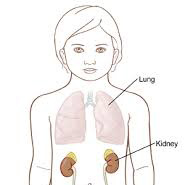by Timothy D. Klasson, Kidney Cancer Researcher, University Medical Center Utrecht, the Netherlands
 The incidence of renal tumors is increasing among children and adolescents in the United States, according to research published in Pediatrics. David A. Siegel, MD, MPH, of Emory University (Atlanta) and colleagues identified cancers diagnosed among youth, aged 0 to 19 years, during the period 2001 to 2009 using data from the National Program of Cancer Registries and Surveillance, Epidemiology, and End Results (SEER) statewide registries.
The incidence of renal tumors is increasing among children and adolescents in the United States, according to research published in Pediatrics. David A. Siegel, MD, MPH, of Emory University (Atlanta) and colleagues identified cancers diagnosed among youth, aged 0 to 19 years, during the period 2001 to 2009 using data from the National Program of Cancer Registries and Surveillance, Epidemiology, and End Results (SEER) statewide registries.
“This study reports the novel finding that renal carcinoma rates are increasing among children and adolescents,” the researchers wrote. “This study confirms that cancer rates are increasing and further describes rising cancer rates among African Americans.”
The causes of most childhood renal tumors are not known. About 65% of all cancers in children are caused by an inherited mutation (a genetic mutation that can be passed from parents to their children). Many national guidelines for kidney cancer recommend that any patient under the age of 45 be referred for genetic testing. For kidney tumors in children, genetic alterations in a gene known as Wilm’s Tumor 1 (WT1) results most commonly in nephroblastoma, or less commonly mutations in tumor suppressor genes such as VHL (von Hippel-Lindau, 1:36000 births) or Tuberous sclerosis genes (TSC1 or TSC2, about 1:6000 births) may cause renal masses in children, although these are also rare events.
In infants and very young children, clear cell carcinoma in the kidney is indicative of translocations between two chromosomes, usually affecting one part of the X chromosome, called Xp11 translocations. Kidney cancer in children as well as adults has also been linked with exposure to certain environmental factors such as trichloroethylene, an industrial byproduct, and the extract of the plant Aristolochia which is sometimes found in traditional medicines. The most commonly observed symptom of renal cancer is a hard lump in the abdomen, although rarely children may have blood in their urine, nausea, or abdominal pain. If detected early, treatment for kidney tumors has a decent rate of success, although prognosis is dependent on the subtype and stage.
For further reading:
http://www.ncbi.nlm.nih.gov/pubmed/21054158
http://www.cancer.gov/cancertopics/pdq/treatment/wilms/Patient/page1
http://www.urologyhealth.org/urology/index.cfm?article=25
http://en.wikipedia.org/wiki/Kidney_cancer
